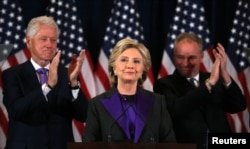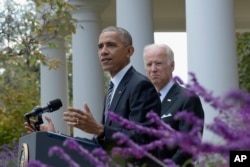America's Democratic political elite tried to move the country toward acceptance and reconciliation Wednesday in the wake of Republican Donald Trump's stunning presidential victory that continues to reverberate around the world. Democratic candidate Hillary Clinton and President Barack Obama both spoke about the need for the country to give Trump a chance, even as many Democrats remained shell-shocked over the election results.
Clinton, who hoped to become the first woman president, officially conceded Wednesday, hours after Trump claimed a victory that will make him the 45th president of the United States on January 20.
Clinton told supporters and crestfallen aides at a gathering in New York that while the election results will be "painful for a long time," it was time to turn the page. "We owe him an open mind and a chance to lead," she said.
Clinton also considered the deeper meaning of Tuesday's results.
"We have seen that our nation is more deeply divided than we thought,” she said. “But I still believe in America, and I always will, and if you do, then we must accept this result and then look to the future."
At times speaking with emotion, Clinton also tried to keep the focus on the future.
"I hope that he will be a successful president for all Americans,” she said. “This is not the outcome we wanted, or we worked so hard for. And I am sorry that we did not win this election for the values we share and the vision we hold for our country."
Obama: ‘We're all on the same team’
Following on Clinton's conciliatory tone, Obama made a brief statement at the White House where he urged a divided country to rally behind Trump as the country's next commander in chief.
"We are not Democrats first. We are not Republicans first. We are Americans first," Obama said, with Vice President Joe Biden at his side. "We are patriots first. We all want what is best for this country. That is what I heard in Mr. Trump's remarks last night. That is what I heard when I spoke to him directly, and I was heartened by that."
On the campaign trail, Obama made little secret of his disdain for Trump as he furiously worked in the final weeks to try to ensure that Clinton was his successor.
To find the last Democratic president to succeed a two-term member of his party, you must go back to 1948 when Harry Truman won the presidency after Franklin Roosevelt had won the previous four elections beginning in 1932. Truman succeeded Roosevelt as president upon FDR's death in April 1945.
Trump's conciliatory note
President-elect Trump's conciliatory note came in his victory speech early Wednesday amid cheering supporters at a Manhattan hotel.
"For those who have chosen not to support me in the past, of which there were a few people, I am reaching out to you for your guidance and your help so that we can work together and unify our great country," he said.
Trump will have the benefit of a Republican-controlled Congress, a prospect that excites House Speaker Paul Ryan, who spoke to reporters in his home state of Wisconsin.
"He [Trump] connected in ways with people that no one else did,” Ryan said. “He turned politics on its head, and now Donald Trump will lead a unified Republican government."
Ryan and Trump have had a strained political relationship dating back to the Republican primaries and his eventual, though lukewarm, endorsement of Trump.
Working-class voters rise up
Trump owes his victory in large part to a surge of white working-class voters frustrated with economic issues, especially in states in the upper Midwest that have been Democratic strongholds since the 1992 election, won by Bill Clinton.
"The reason Trump won was the vast wave of discontent with the lingering effects of the financial collapse of 2008 and of the transformation of the American economy and the impact that has had on workers and on average folks over past decades," said Brookings Institution scholar Norman Eisen.
Analysts and pollsters are also busy digging into why the election predictions of a Hillary Clinton victory were so far off the mark. Clinton was given a 3- to 5-point lead in many national polls on the eve of the election, and her leads in several battleground states like Pennsylvania, Michigan and Wisconsin were thought to be relatively safe.
With so many pre-election polls giving Clinton an edge, expect plenty of soul-searching by pollsters and political analysts alike, said Molly Reynolds, also at Brookings.
"Were the polls asking the right questions of the right voters?” she said. “Were we accurately measuring how accurately voters are to [actually] vote? And just sort of really digging into what it is about the polling data that led us all to make a different prediction than what was actually realized."
There will be plenty in the aftermath of the Trump election to keep political analysts and pollsters busy for months. Trump himself will be busy in the days ahead, beginning the process of a presidential transition, planning for a presidential inauguration, and considering who he might like in his cabinet.









